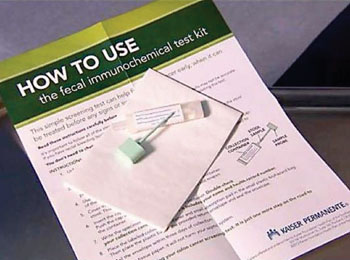Fecal Immunochemical Test Effective for Annual Colon Cancer Screening
By LabMedica International staff writers
Posted on 10 Feb 2016
The fecal immunochemical test (FIT) is highly sensitive for detecting colorectal cancer, and adherence to annual follow-up screening among initial participants is high, making the noninvasive test feasible and effective for annual colorectal cancer screening programs. Posted on 10 Feb 2016
Colorectal cancer (CRC) is the second leading cause of cancer death in the USA. Evidence shows that highly sensitive guaiac-based fecal occult blood tests (FOBT), which are recommended for annual screening of average risk patients between the ages of 50 and 75, can reduce morbidity and mortality from colorectal cancer. FIT has higher detection rates for CRC and advanced adenomas than FOBT, but little is known about how well FIT works over several rounds of annual screening.

Image: The fecal immunochemical test (FIT) kit used in screening for colorectal cancer (Photo courtesy of Kaiser Permanente).
Scientists working for Kaiser Permanente (Oakland, CA, USA) and their colleagues carried out a retrospective cohort study and collected data on 323,349 health plan members aged 50 to 70 years. The members were on their FIT mailing date in 2007 or 2008 and had completed the first round of FIT and were followed for up to four screening rounds. Screening participation included an FIT positivity, equal to or greater than 20 µg of hemoglobin/g, which has positive predictive values for adenoma and CRC, and FIT sensitivity for detecting CRC obtained from Kaiser Permanente electronic databases and cancer registries.
Of the patients invited for screening, 48.2% participated in round one. Of those who remained eligible, 75.3% to 86.1% participated in subsequent rounds. Median follow-up was 4.0 years, and 32% of first round participants crossed over to endoscopy over four screening rounds and 7.0% were due to a positive FIT result. The FIT positivity rate of 5.0% and positive predictive values (adenoma, 51.5%; CRC, 3.4%) were highest in the first round.
Overall, programmatic FIT screening detected 80.4% of patients with CRC diagnosed within one year of testing, including 84.5% in round one and 73.4% to 78.0% in subsequent rounds. The authors concluded that annual FIT screening was associated with high sensitivity for CRC, with high adherence to annual follow-up screening among initial participants. The findings indicate that annual programmatic FIT screening is feasible and effective for population-level CRC screening. The study was published on January 26, 2016, in the journal Annals of Internal Medicine.
Related Links:
Kaiser Permanente













